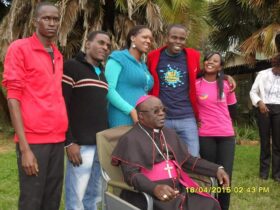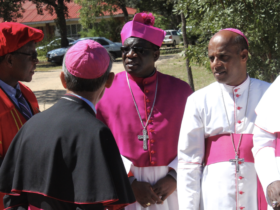A Christian Response to Bioethical Challenges
We pray for Christians facing new bioethical challenges; may they continue to defend the dignity of all human life with prayer and action.
A Reflection by Fr Chris Chatteris SJ
Does the fact that something, like having a pig’s heart transplant, is now scientifically possible, imply that we should do it? That’s the nub of the bioethical problem – if it’s possible, does that mean we should do it?
Another example: it might become possible to arrest or even reverse the ageing process. Some of us might become ‘amortal’. (Yuval Harari points out in his book Sapiens that we would not be immortal since we could still be murdered, die in accidents or commit suicide).
The answer is not as easy as it seems. Our gut reaction is that we would certainly not want to live for centuries since we would probably end up being bored, cynical and suicidal. And yet, much of modern medicine of the last century has been dedicated to extending the life of people who a former age would have considered to have already lived long enough. My mother, who died in her nineties, once said, in her eighties: ‘We’re living so long these days; it’s ridiculous!’
But we do cling to dear life, even when its quality is terrible. We also spend vast sums clinging to it, sums which could be better used to prevent millions of child deaths. The question of the resources we put into human biological interventions seems to me to be the big un-examined moral issue of our time. Perhaps one of the positive things to come out of the covid pandemic is that it has underlined the fact that the health of my poorer neighbour has an impact on my own health.
The Church often reacts with dismay at biological processes which appear to be ‘playing God’. Things like cloning or creating trans-species creatures spring to mind. Again, it is not so easy to find a way through this. Doctors actually play God all the time in hospitals in the sense of making life and death decisions. Unless we take a radical ‘let nature take its course’ stance, then any attempt to heal an illness or stave off death, or not, is ‘playing God’.
The beginning of an answer to this is that we believe in a God who is precisely a loving and a healing God, made flesh in the healer Jesus. Therefore, we are encouraged to join him in his healing ministry.
The other is a tricky distinction between working with/imitating nature to effect healing and manipulating it to do so. Vaccines work by stimulating the body’s immune system, working with nature. My recently inserted artificial hip joint is an ingenious piece of ‘bio-mimicry’ and the process required very ordinary healing processes for it to be completed. I’m not so sure I would welcome a genetic alteration which would give me a hip with the power and flexibility of a baboon!
And yet, there are some genetic modifications which can prevent serious illnesses. Such ‘gene-editing’ can prevent the misery of sickle cell anaemia, for example. Can we regard these genetic variations as ‘mistakes’ or ‘flaws’ and try to correct them, in the analogous way that we regard a cleft palate as a correctable flaw in a new born baby?
The Church, rightly, proceeds with caution. There are still many unresolved ethical considerations such as the possible unintended consequences of gene editing. The scientists tell us cannot yet be sure that one solution will not cause another worse problem.
There is a felicitous unanimity between Church and secular ethicists on the undesirability of editing our genes to enhance strength and intelligence or determine the colour of our children’s eyes. Here we are moving out of the realm of healing into a kind of bio-consumerism which most probably would not end well. The last attempt to breed a super-race should give us pause. And race of genetic superpersons would deprive us of the genetic variety which is fundamental to the health of every species.
Pray for the ethicists who have to grapple with these issues. They are coming thick and fast and they change almost by the day.










Leave a Reply